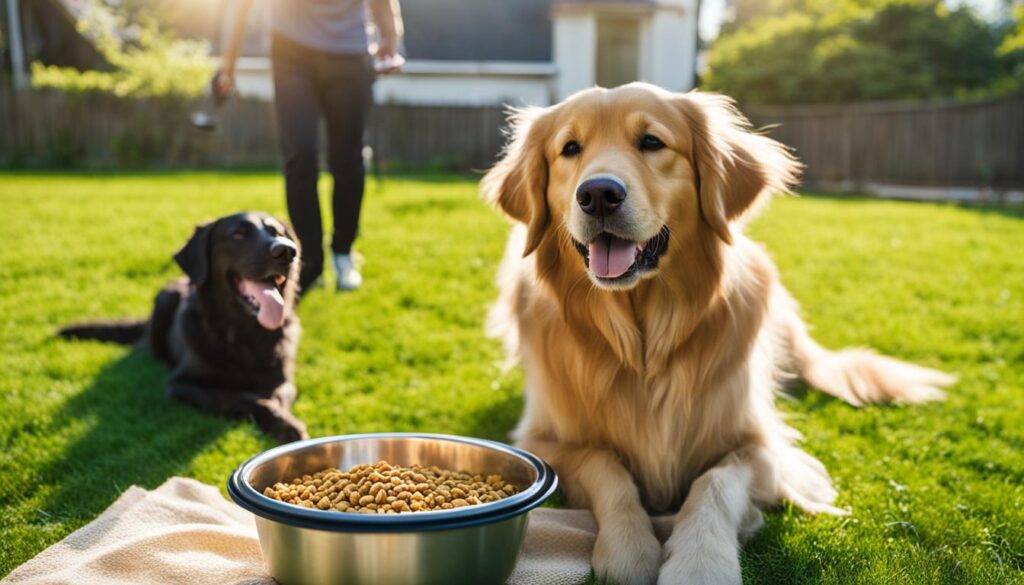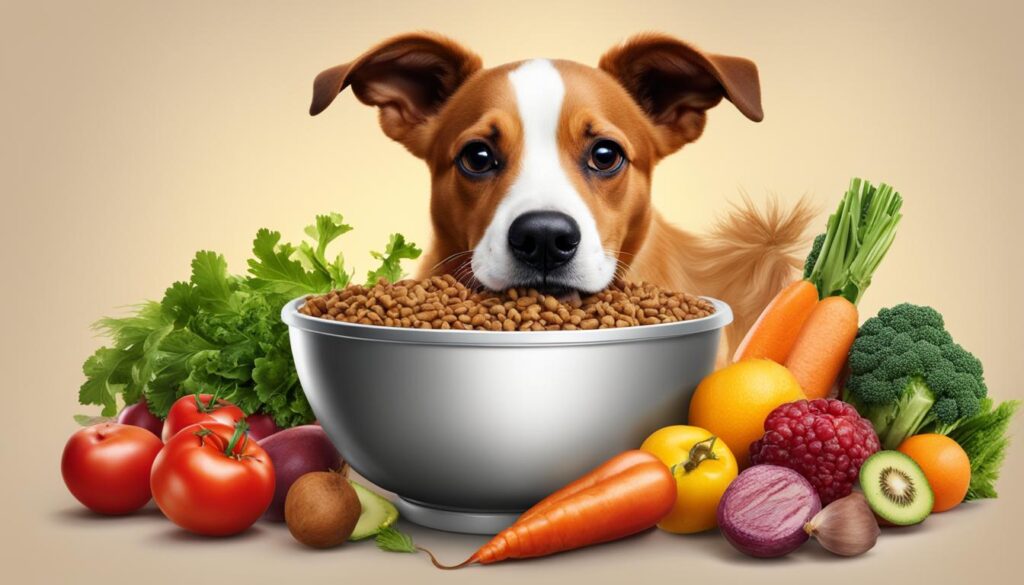Are you considering a gluten-free diet for your dog? Gluten intolerance in dogs may be rare, but if your furry friend is sensitive to gluten or has allergies, it’s important to explore safe and nutritious options. In this article, we’ll dive into the world of gluten-free dog diets, discussing the benefits, considerations, and the difference between gluten-free and grain-free options. But before we proceed, always remember to consult with your veterinarian to ensure the best diet plan for your dog’s specific needs.
Key Takeaways:
- Gluten-free dog diets provide safe and nutritious choices for dogs with gluten intolerance or allergies.
- Consult with a veterinarian before making any dietary changes for your dog’s specific needs.
- Gluten-free dog foods exclude grains containing gluten, while grain-free dog foods eliminate all grains.
- A gluten-free diet may help alleviate symptoms such as skin irritations or gastrointestinal issues.
- Consider potential risks associated with grain-free diets and stay informed about the latest research.
Understanding Gluten-Free and Grain-Free Dog Foods
When it comes to choosing the right diet for your dog, it’s essential to understand the difference between gluten-free and grain-free options. Gluten is a protein found in grains like wheat, barley, and rye. Gluten-free dog foods eliminate these grains and are suitable for dogs with gluten sensitivity or allergies. On the other hand, grain-free dog foods go a step further and exclude all grains, including wheat, barley, rice, oats, and rye.
While gluten allergies are rare in dogs, some may have sensitivities or allergies to grains. By choosing a gluten-free or grain-free diet, you can provide your furry friend with a suitable alternative that meets their specific needs. However, it’s crucial to consult with a veterinarian before making any dietary changes to ensure your dog receives a balanced and complete nutrition.
Table: Gluten-Free Dog Food Brands vs. Grain-Free Dog Food Brands
| Gluten-Free Dog Food Brands | Grain-Free Dog Food Brands |
|---|---|
| Brand A | Brand X |
| Brand B | Brand Y |
| Brand C | Brand Z |
As seen in the table above, there are various gluten-free and grain-free dog food brands available on the market. It’s important to choose high-quality products that meet your dog’s nutritional requirements and are formulated to support their overall health and well-being.
Remember, each dog is unique, and their dietary needs may vary. Consulting with a veterinarian will help you determine the best course of action and ensure your furry friend thrives on a diet that suits their specific requirements.
The Benefits of Gluten-Free and Grain-Free Dog Foods
A gluten-free or grain-free diet may offer benefits for dogs with specific dietary needs. In the case of gluten intolerance or sensitivities, a gluten-free diet can help alleviate symptoms such as skin irritations or gastrointestinal issues. Grain-free diets can be beneficial for dogs with grain sensitivities or allergies. There are various options available, including homemade gluten-free meals, commercial gluten-free dog foods, and gluten-free dog biscuits. It’s important to choose high-quality products that meet your dog’s nutritional requirements.
When it comes to gluten-free dog food, homemade recipes can provide a personalized and controlled approach to your dog’s diet. By using gluten-free ingredients such as lean meats, fruits, and vegetables, you can ensure your dog receives a well-balanced and nutritious meal. It’s essential to consult with a veterinarian or a canine nutritionist to ensure the recipe meets your dog’s specific dietary needs.
“Homemade gluten-free meals allow you to have full control over what ingredients go into your dog’s food. It’s a great option for dogs with food sensitivities or allergies as you can carefully choose the ingredients and avoid potential triggers.” – Dr. Jane Smith, Canine Nutritionist
Commercial gluten-free dog foods are also readily available in the market. These products are specially formulated to meet the nutritional needs of dogs with gluten sensitivities or allergies. Look for brands that use high-quality, easily digestible protein sources such as chicken, turkey, or fish. Avoid products that contain fillers, artificial additives, or unnecessary grains.
Benefits of Commercial Gluten-Free Dog Foods:
- Formulated specifically for dogs with gluten sensitivities or allergies
- High-quality protein sources for optimal nutrition
- Avoidance of potential allergens and fillers
- Convenient and easy to serve
- Wide variety of options available
Another option to consider is gluten-free dog biscuits. These treats can be used for training, rewards, or simply as a delicious snack. Ensure that the gluten-free biscuits you choose are made with high-quality ingredients and do not contain any fillers or artificial additives.
| Biscuit Brand | Gluten-Free Ingredients | Size/Quantity |
|---|---|---|
| Brand A | Rice flour, tapioca starch, chicken, sweet potato | 8oz bag |
| Brand B | Oat flour, peanut butter, pumpkin, flaxseed | 12oz bag |
| Brand C | Quinoa flour, turkey, cranberries, carrots | 16oz bag |
Whether you opt for homemade gluten-free meals, commercial gluten-free dog foods, or gluten-free dog biscuits, it’s important to prioritize your dog’s health and well-being. Consult with a veterinarian to determine the best approach for your furry friend and ensure they receive a balanced and nutritious diet without any potential allergens or triggers.
Considerations and Consultation
Before transitioning your dog to a gluten-free or grain-free diet, it’s crucial to consult with a veterinarian. They can assess your dog’s specific nutritional needs and provide guidance on the best course of action. When introducing a new diet, it’s recommended to make a gradual transition by mixing the new food with the old food to avoid digestive upset. Veterinarians can also help identify if other dietary changes are necessary based on your dog’s overall health and any underlying conditions.
Transitioning to a gluten-free dog diet requires careful consideration and monitoring to ensure your dog’s health and well-being. It’s essential to work closely with your veterinarian throughout the transition process and follow their recommendations. They can guide you on the appropriate timing, portion sizes, and any necessary adjustments to your dog’s diet.
In addition to consulting with a veterinarian, it’s important to carefully monitor your dog’s response to the new diet. Observe any changes in their appetite, energy levels, digestion, and overall behavior. Keep a record of these observations and share them with your veterinarian during follow-up appointments to ensure the diet is providing the desired benefits for your dog.
Remember, every dog is unique, and what works for one may not work for another. The transition to a gluten-free or grain-free diet should be tailored to your dog’s specific needs. With the guidance of a veterinarian, you can make informed decisions and provide the best possible dietary care for your furry friend.

The Controversy Surrounding Grain-Free Diets
Grain-free diets for dogs have been at the center of controversy in recent years. While these diets have gained popularity among pet owners looking to provide their dogs with a natural and ancestral diet, concerns have been raised about their potential health risks.
A study conducted by the FDA found a possible link between certain grain-free diets and the development of dilated cardiomyopathy (DCM) in dogs. DCM is a serious heart condition that can lead to heart failure and even death. The study found that dogs fed grain-free diets, particularly those containing peas, lentils, or potatoes as main ingredients, were more likely to develop DCM.
These findings have prompted the FDA to open an investigation into the relationship between grain-free diets and DCM. While the exact cause of the link is still unclear, it is important for dog owners to be aware of the potential risks associated with these diets and to consult with a veterinarian before making any dietary changes.
While the controversy surrounding grain-free diets continues, it is crucial to prioritize your dog’s health and well-being. If you have concerns about gluten intolerance in dogs or are considering a gluten-free or grain-free diet, consult with a veterinarian who can provide guidance based on your dog’s individual needs and the latest research.
Gluten-Free Dog Treat Recipes
If you are looking for gluten-free dog treat options, here are a few recipes to try:
1. Sweet Potato Bites:
- Ingredients:
- 1 medium sweet potato
- 1/4 cup coconut flour
- 2 tablespoons peanut butter (make sure it does not contain xylitol, as it is toxic to dogs)
- 1 egg
- Instructions:
- Preheat your oven to 350°F (175°C) and line a baking sheet with parchment paper.
- Peel and grate the sweet potato.
- In a bowl, mix together the grated sweet potato, coconut flour, peanut butter, and egg until well combined.
- Take small portions of the mixture and roll them into bite-sized balls. Place them on the prepared baking sheet.
- Bake for 15-20 minutes, or until the bites are firm and slightly golden.
- Let the treats cool completely before serving them to your dog.
2. Pumpkin Peanut Butter Cookies:
- Ingredients:
- 1 cup canned pumpkin
- 1/2 cup peanut butter
- 2 cups brown rice flour
- 1 teaspoon cinnamon
- 1/4 cup water
- Instructions:
- Preheat your oven to 350°F (175°C) and line a baking sheet with parchment paper.
- In a large bowl, mix together the pumpkin, peanut butter, brown rice flour, cinnamon, and water until well combined.
- Roll the dough into small balls and place them on the prepared baking sheet. Flatten them slightly with a fork.
- Bake for 25-30 minutes, or until the cookies are firm and golden brown.
- Allow the cookies to cool completely before giving them to your furry friend.
Table: Grain-Free Dog Food Brands
| Brand | Key Features | Price Range | Available Flavors |
|---|---|---|---|
| Acana | High-quality ingredients, includes a variety of proteins | $$$ | Chicken, beef, fish, lamb, duck, turkey |
| Orijen | Biologically appropriate formulas, rich in meat and fish | $$$ | Chicken, turkey, fish, beef, lamb |
| Merrick Grain-Free | Natural ingredients, no artificial additives or preservatives | $$ | Chicken, beef, fish, lamb, turkey, duck |
| Wellness CORE | Protein-focused recipes, grain-free and nutrient-rich | $$ | Chicken, turkey, fish, lamb, beef |

Conclusion
While gluten-free and grain-free dog food options exist, it’s essential to consider your dog’s specific needs and consult with a veterinarian before making any dietary changes. Gluten-free diets may be suitable for dogs with gluten intolerance, while grain-free diets can be beneficial for dogs with grain sensitivities or allergies.
However, it’s important to stay informed about any potential risks associated with grain-free diets and seek professional advice for the best course of action for your furry friend’s health and well-being.
Your veterinarian can help you navigate the world of dog diets and determine what is best for your beloved pet. They can provide personalized recommendations based on your dog’s unique needs, taking into account any existing health conditions or dietary restrictions.
Remember, your dog’s well-being is of utmost importance. By considering their specific needs and seeking professional advice, you can make informed decisions about their diet and ensure that they receive the best possible care.
FAQ
Are gluten allergies common in dogs?
No, gluten allergies are rare in dogs. However, some dogs may have sensitivities or intolerances to gluten.
What is the difference between gluten-free and grain-free dog foods?
Gluten-free dog foods exclude grains like wheat, barley, and rye, while grain-free dog foods eliminate all grains, including rice and oats.
Are there any benefits to a gluten-free or grain-free diet for dogs?
Yes, a gluten-free diet can help dogs with gluten sensitivities or allergies, while a grain-free diet can be beneficial for dogs with grain sensitivities or allergies.
Can I make homemade gluten-free meals for my dog?
Yes, homemade gluten-free meals can be an option. Just make sure you consult with a veterinarian to ensure they meet your dog’s nutritional needs.
Should I consult with a veterinarian before transitioning my dog to a gluten-free or grain-free diet?
Absolutely! It’s crucial to consult with a veterinarian to understand your dog’s specific needs and ensure a balanced and complete nutrition.
Is there any controversy surrounding grain-free diets for dogs?
Yes, recent studies have linked certain grain-free diets to the development of a heart condition called dilated cardiomyopathy (DCM) in dogs. Stay updated on the latest research and consult with a veterinarian regarding any concerns or potential risks.





